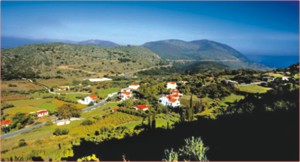Science Feature
Odyssey's End?
The Search for Ancient Ithaca
Fergus M. Bordewich, Photographs by Jeffrey Aaronson
 A British researcher believes he has at last pinpointed the island to which Homer's wanderer returned and a new wealth of data supports his thesis A British researcher believes he has at last pinpointed the island to which Homer's wanderer returned and a new wealth of data supports his thesis
For more than 2,000 years, scholars have been mystifiedand intriguedby a question central to our understanding of the ancient world: where is the Ithaca described in Homer's Odyssey? The descriptions in the epic poem do not coincide with the geography of the modern island of Ithaca, one of the Ionian islands off the western coast of Greece.
Since 2003, an interdisciplinary team of geologists, classicists and archaeologists has proposed a paradigm-shifting answer to that longstanding mystery. Their breakthrough thesisthat the peninsula of Paliki on the Ionian island of Cephalonia is the site of ancient Ithacawas revealed in Odysseus Unbound: The Search for Ancient Ithaca, published to acclaim by Cambridge University Press in 2006.
In the journal Geoscientist, the team of pioneering scholars releases detailed results and photographs from research conducted during the first year of sponsorship by FUGRO, the global geotechnical, survey and geoscientific service company. The wealth of new data provides dramatic support for the thesis that Paliki is indeed the site of ancient Ithaca.
According to the Odysseus Unbound project, “The new research shows that [Paliki], this 6 kilometre-long and up to 2 kilometre-wide isthmus contains no solid limestone down to at least 90 metres below today's surface. The fill is loose material, some of which originated through catastrophic rockfall from the earthquake-prone mountain range to the east.”
The newly released data provide significant support for the theory that the peninsula of Paliki, today connected to the island of Cephalonia by an isthmus, was once separate, low-lying island of Homer's Ithaca. As scholar Gregory Nagy of the Center for Hellenic Studies in Washington, D.C., told Smithsonian Magazine in 2006: “We'll never read the Odyssey in the same way again."
Robert Bittlestone is standing above the village of Petrikata, looking over red-tile roofs down upon a narrow isthmus that connects the two parts of the island of Cephalonia, off Greece's western coast. In the valley below, farmers in overalls are harvesting olives. A light breeze carries the scent of oregano and thyme. “This looks like solid ground that we're standing on,” Bittlestone says. “But everything under us is rockfall. Across that valley was the ancient island of Ithaca.”
Bittlestone, a management consultant by profession, believes he has solved a mystery that has bedeviled scholars for more than 2,000 years. In Odysseus Unbound, published this past October by Cambridge University Press, he argues that a peninsula on the island of Cephalonia was once a separate islandIthaca, the kingdom of Homer's Odysseus some 3,000 years ago. He believes that the sea channel dividing the two islands was filled in by successive earthquakes and landslides, creating the peninsula of Paliki, as it is known today.
Like Heinrich Schliemann, the businessman who discovered the site of ancient Troy in the 1870s, and Michael Ventris, the architect who deciphered the written language of Minoan Crete in the 1950s, the 54-year-old Bittlestone is part of an honorable tradition of inspired amateurs who have made extraordinary discoveries outside the confines of conventional scholarship. “Bittlestone's insight is brilliant,” says Gregory Nagy, director of the Center for Hellenic Studies, in Washington, D.C. “He has done something very important. This is a real breakthrough convergence of oral poetry and geology, and the most plausible explanation I've seen of what Ithaca was in the second millennium B.C. We'll never read the Odyssey in the same way again.”
(Source: yahoo.com)
| 